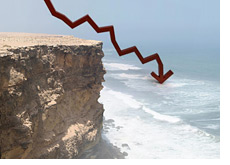Why 2010 isn't like 2004
 Looking at Keller’s brutal long term public opinion tracking chart, one thing stands out: it’s not quite true to say that Chávez has never gone into an election trailing badly in these kinds of "Is the country on the right track?" questions. A couple of quarters ahead of the Recall Referendum of 2004, his poll numbers were in the toilet: worse than they are now, even. But the guy managed to turn it around quite quickly ahead of the vote…could he do it again this year?
Looking at Keller’s brutal long term public opinion tracking chart, one thing stands out: it’s not quite true to say that Chávez has never gone into an election trailing badly in these kinds of "Is the country on the right track?" questions. A couple of quarters ahead of the Recall Referendum of 2004, his poll numbers were in the toilet: worse than they are now, even. But the guy managed to turn it around quite quickly ahead of the vote…could he do it again this year?
The short answer is: probably not.
To grasp why, you need to cast your mind back to those heady post-paro days of 2003. Soon after the massive economic dislocations of the paro, oil prices started going up, and the government started spending the windfall profits very fast, through spending programs that targetted the poor. The onset of the misiones coincided with a feverish consumption boom and strong economic growth coming off from the funk created by the oil strike. The result were good times – and the general buoyancy parlayed into the spike in public opinion sentiment Keller’s chart shows so clearly.
It was a spike that would last precisely as long as the consumption boom, though.
This time around, the situation couldn’t be any more different. The sheen has worn off of the misiones almost completely. As was bound to happen, each of them has ossified into a bureaucracy, each supporting its own fauna of blood-sucking bureaucratic parasites, each prone to the breakdown and neglect that chavista mismanagement inevitably leaves in its trail.
The macroeconomic backdrop is radically redrawn, too. Instead of economic growth, we’re looking at the second year of a deepening recession which, alongside ongoing inflation, translates into shrinking purchasing power for most people – in particular among the poor. Even if oil prices did spike somehow, inflationary expectations are so strong now that any unexpected fiscal expansion would tend to inflate prices rather than stimulate the economy. A stagflationary spiral defeats the standard keynesian recipe-book. This is a lesson the rest of the world learned in the late 70s…but not us.
So there’s no short-term fix the government can appeal to to grab its popularity back. Which is what makes the situation so dramatic for them. Even if money fell from the sky, it would deepen the problem rather than fixing it.
And all of that is before you even get to the three strikes of the "tas ponchao" campaign: water rationing, electric rationing, out of control crime. A threesome that, on its own, would shred the support of independents.
I tend to agree that faced with such a scenario – and believing the kind of crazy shit their radical wing believes – chavismo’s going to tend towards foul play. The idea that allowing the opposition to reach power is the single worst thing that can happen in the universe is too hard-wired into the chavista mindset for them to countenance any kind of effective power sharing. These guys have too much to lose and far too much to hide for that.
My guess is that they won’t cheat but instead allow the opposition to take a majority in the A.N. while declawing it – doing to the A.N. more or less what they did to the Alcaldía Metropolitana. My pet scenario includes the outgoing National Assembly approving a kind of all encompassing Enabling Law to the president, allowing him to legislate by decree until 2015. That way they get to pose, abroad, as a country so democratic the opposition even controls the parliament while retaining complete control over the law.
Clever, huh?
Update: I edited the lede to avoid confusion.
Caracas Chronicles is 100% reader-supported.
We’ve been able to hang on for 22 years in one of the craziest media landscapes in the world. We’ve seen different media outlets in Venezuela (and abroad) closing shop, something we’re looking to avoid at all costs. Your collaboration goes a long way in helping us weather the storm.
Donate




